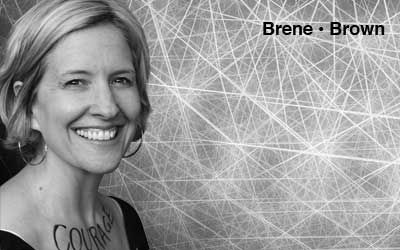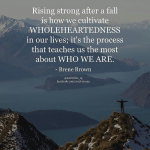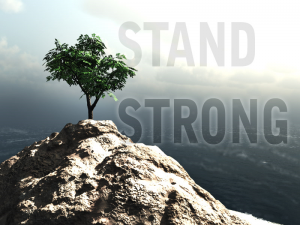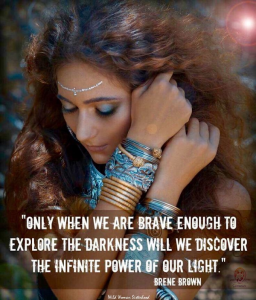‘People are sick of being afraid all the time’
January 21, 2018: (HD) Sunday Sermon by Dr. Brené Brown at Washington National Cathedral Full Service
“You can’t give children what you don’t have yourself,” says Brené Brown.
“No matter how much importance you place on it.” For instance, you can’t raise children to be more resilient to shame than you are yourself. “I can encourage my daughter to love her body,” she says, “but what really matters are the observations that she makes about my relationship with my own body. Damn it. So the question isn’t so much, ‘That Are you parenting the right way?’ as it is, ‘Are you the adult you want your child to grow up to be?'”
Brown, a Texan academic turned bestselling author, wife, daughter, sister and mother of two, came to prominence after recording a Ted talk in which she argued that to live a full life requires courage – and showing courage means doing things that make you feel vulnerable. It quickly became one of the most successful Ted talks of all time: more than 10 million people have seen it online and shared her message we should stop worrying about being perfect, accept ourselves as we are, and also engage meaningfully with one another. http://www.chasejarvis.com/blog/brene-brown-rising-strong-in-a-digital-age/
To a cynical British ear, this may sound embarrassingly new age, Brown’s Ted talk has been embraced by the American military and she’s in huge demand as a speaker at global corporations. Neither is she a model of perfection: in a video call from her home in Houston, Brown tells me she flips people off when she’s driving and would instinctively rather punch somebody than make herself vulnerable.
But her academic research showed the shaming culture we live in makes it harder than ever to show courage and be vulnerable – and somebody had to speak out.
“People are sick and tired of being afraid all the time. People want to be brave again. So the message is, do it! Get your courage on, but be clear that it won’t be easy. It’s going to feel like shit.”
Researching her latest book, Brown carried out formal academic interviews with 1,280 people. “One of the most powerful experiences I had was asking middle-school children the difference between belonging and fitting in. They said, fitting in is when you want to be part of something and belonging is when people want you just as you are. I get to be me if I belong and I have to be like you to fit in. What was shocking was when they said, ‘Miss, it’s really hard not to belong at school, but nothing is as painful as not belonging at home.'”
Without meaning to, parents cause that pain when they allow children to sense the disappointment, embarrassment or indifference they feel towards them. That is something Brown believes we can all learn to minimise, by fighting against the shaming culture we inhabit and teaching children resilience.
We live in a culture with a strong sense of scarcity. “We wake up in the morning and we say, ‘I didn’t get enough sleep.’ And we hit the pillow saying, ‘I didn’t get enough done.'” We’re never thin enough, extraordinary enough or good enough – until we decide that we are. “For me,” says Brown, “the opposite of scarcity is not abundance. It’s enough. I’m enough. My kids are enough.”
If we really believe this, we stop trying to fix everything for them. “If one of my kids is struggling, it feels excruciating to let them go to school and figure it out for themselves. Hope is a function of struggle. People with the highest hopefulness have the knowledge that they can move through adversity. When we take adversity from our children, we diminish their capacity for hope.
https://www.psychologytoday.com/us/blog/partnering-in-mental-health/201408/bren-brown-empathy-vs-sympathy-0
“It’s tough to step back.
I would much rather intervene and fix things myself.
If they’re struggling with a teacher, I can whip out an email and it’s pretty impressive and it takes five minutes. However, to sit down and talk to Ellen and let her write the email and proof it with her and talk about how to structure it – that is going to take 45 minutes.”
When time itself feels scarce, the temptation is to take the easy, quick option. But Brown describes these everyday opportunities for loving intervention as Sliding Doors moments (after the film) – opportunities we either seize or deliberately avoid. We can avoid them occasionally, but do it too often and relationships suffer, not just between parent and child but between couples.
“If you are always choosing to turn away, then trust erodes in a relationship – very gradually, very slowly. When the people we love stop paying attention, trust begins to slip away and hurt starts seeping in. Disengagement triggers shame and our greatest fears – the fears of being abandoned, unworthy and unlovable. What can make this covert betrayal so much more dangerous than something like an affair is that we can’t point to the source of our pain – there’s no event, no obvious evidence of brokenness.”
To seize every opportunity to show loving commitment would be shattering, wouldn’t it? Who, really, has the time? And what if the other person doesn’t let you even try? One of Brown’s most appealing qualities is that she openly admits to failing frequently at what she encourages others to do – but keeps trying anyway.
Showing courage, in the name of meaningful relationships, is hard work. “And we don’t do it perfectly,” Brown says. “When we don’t, we apologise and make amends.” People who don’t have the capacity to apologise, she contends, are normally people who never saw their parents apologise, and grew up in an environment that relied on shame rather than guilt. In guilt, we feel that we have done something bad. With shame, we feel we are bad. “Guilt is just as powerful, but its influence is positive, while shame’s is destructive.
Shame erodes our courage and fuels disengagement.”
Happily, her husband Steve, a pediatrician, understands her work and they usually support each other. But arguments are inevitable. “We disagree in front of the children, but a lot of times we will say, ‘Your dad and I need to talk to each other right now’, and ask for some space. We are comfortable to say we are having difficulty.”
Does that worry the children?
“I asked Ellen that the other day, when [Steve and I] were having a little cold war, and she said, ‘No, I know you will use your words to work it out.’ In fact, I think it can be scary for people who never see their parents argue.”
When her daughter was much younger, Brown found herself renegotiating family culture with her own father. “Ellen was three or four. We were in my dad’s house and I said ‘It’s time to turn off the TV’, and she said she didn’t want to. And my dad bristled. I was not raised like that! From him, I’d have got a look that might mean a spanking. But I said to her, ‘I understand you want to watch Dora the Explorer’, and so on, and my dad said, ‘Dammit, what are you raising, a hostage negotiator?’ But the next day I went to see my dad again and I saw him trying to do it. He said to her, ‘You have a couple of choices …
“So family culture is not just about parents. It’s also grandparents. They matter hugely. We have to talk with them and ask them to avoid saying things like ‘shame on you’, but without that being received as a criticism of how we were raised ourselves. I have a picture of my grandmother when she was heavily pregnant, with a cigarette and an ashtray on her belly. I don’t blame her, any more than I blame my parents for not explaining the difference between shame and guilt.”
Researcher Brené Brown (the woman behind the TED video seen round the world) explains why things that we believe will turn everything around are…well…just plain wrong. As unique as we all are, an awful lot of us want the same things. We want to shake up our current less-than-fulfilling lives. We want to be happier, more loving, forgiving and connected with the people around us. So…we make decisions (“I’m going to hang out with happy people!”); we give ourselves lectures (“If you’d just stop feeling guilty, you’d able to do what you want); and we strive for markers of that accomplishment (“Just go to the completely intimidating party and meet one person!”).
Brené Brown, PhD, LMSW, author of The Gifts of Imperfection and research professor at the University of Houston, has spent the last 12 years figuring out what keeps us from the living—despite our best efforts—the kind of wholehearted, fully involved existences that we’re trying to lead. It turns out that a lot of the assumptions we hold so dear and we believe will turn around everything are…well…just plain wrong.
Brené Brown’s Top 4 Life Lessons
1. Fitting In Is Not Belonging
There are so many terms we use every day whose meanings are gauzy, if not downright imprecise—which makes it hard to get your head around what’s really going on in your life.
For example, contrary to what most of us think: Belonging is not fitting in. In fact, fitting in is the greatest barrier to belonging. Fitting in, I’ve discovered during the past decade of research, is assessing situations and groups of people, then twisting yourself into a human pretzel in order to get them to let you hang out with them. While belonging is something else entirely — it’s showing up and letting yourself be seen and also becoming known for who you really are—love of gourd painting, intense fear of public speaking and all.
Many us suffer from this split between who we are and who we present to the world in order to be accepted, (Take it from me: I’m an expert fitter-inner!) But we’re not letting ourselves be known, and this kind of incongruent living is soul-sucking.
In my research, I’ve interviewed a lot of people who never fit in, who are what you might call “different”: scientists, artists, thinkers. And if you drop down deep into their work and who they are, there is a tremendous amount of self-acceptance. Some of them have to scrap for it, like the rest of us, but most are like this neurophysicist I met who, essentially, told me.
“My parents didn’t care that I wasn’t on the football team, and my parents didn’t care that I was awkward and geeky. I was in a group of kids at school who translated books into the Klingon language. And my parents were like, ‘Awesome!’ They took me to the Star Trek convention!” He got his sense of belonging from his parents’ sense of belonging, and even if we don’t get that from Mom and Dad, we have to create it for ourselves as adults—or we will always feel as if we’re standing outside of the big human party.
The truth is: Belonging starts with self-acceptance. Your level of belonging, in fact, can never be greater than your level of self-acceptance, because believing that you’re enough is what gives you the courage to be authentic, vulnerable and imperfect. When we don’t have that, we shape-shift and turn into chameleons; we hustle for the worthiness we already possess.
2. Guilt Is Not Bad for You
I’m just going to say it: I’m pro-guilt. Guilt is good. Guilt helps us stay on track because it’s about our behavior. It occurs when we compare something we’ve done—or failed to do—with our personal values. The discomfort that results often motivates real change, amends and self-reflection.
I interview people of just about every faith you can imagine, and a lot of them will say, “Oh, I’ve got major Catholic guilt” or “I’ve got major Jewish guilt.” And I’ll say, “Tell me about it.” And they’ll say, “Well, if I don’t show up for Shabbat every Friday, I’m a bad son. My brother always goes.”
Clinically speaking, that’s not guilt. That’s shame, and one of the worst things about shame is that we often don’t know when we’re feeling it. When I’m interviewing subjects, I hear, “I’m worthless. I’m a piece of crap. I don’t blame my parents for hating me—who wouldn’t?” And this is shame. We may not know how to name it. But we know how to feel it—and it is a totally separate emotion from guilt
A clear way to see the difference is to think about this question:
If you made a mistake that really hurt someone’s feelings, would you be willing to say, “I’m sorry. I made a mistake”? If you’re experiencing guilt, the answer is yes: “I made a mistake.” Shame, on the other hand, is “I’m sorry. I am a mistake.” Shame doesn’t just sound different than guilt; it feels different. Once we understand this distinction, guilt can even make us feel more positively about ourselves, because it points to the. . . gap between what we did and who we are—and, thankfully, we can change what we do.
3. Perfectionism Is Not About Striving for Excellence
For some of us (including me), what I’m about to say is horrifying: Perfectionism is not about achievement and growth. Perfectionism is the belief that if we live perfectly, look perfectly and act perfectly, we can avoid the pain of blame, judgment and shame.
Most perfectionists (also including me) grew up being praised for achievement and performance in our grades, manners and appearance. Somewhere along the way, we adopted this dangerous and debilitating belief system: I am what I accomplish and how well I accomplish it. A ticker tape began to stream through our heads: Please. Perform. Perfect.
Healthy striving, meanwhile, focuses on you. It occurs when you ask yourself, “How can I improve?” Perfectionism keeps the focus on others. It occurs when you ask, “What will they think?” Research, unfortunately, shows that perfectionism hampers success and often leads to depression, anxiety, addiction and missed opportunities, due to fears of putting anything out in the world that could be imperfect or disappoint others. It’s a 20-ton shield we lug around thinking it will protect us when, in fact, it’s the thing that’s really preventing us from taking flight. Another way to think about it? Consider Leonard Cohen’s song “Anthem,” which says, “There’s a crack in everything. That’s how the light gets in.”
4. Vulnerability Is an Act of Courage
There are a few myths about vulnerability that I think keep us from being wholehearted people who can fully give and receive love. The first is that vulnerability is a weakness. The second is that it’s optional.
First of all, vulnerability is not weakness. It’s probably the most accurate measure of our individual courage. When I ask research subjects to give me an example of being in situations where they feel vulnerable, they say, “Taking responsibility for something that went wrong at work” or “Telling my boyfriend that I love him” or “Calling my friend whose child just died” or “Sending my kid to school knowing she is struggling but knowing she had has to figure it out” or “Meeting with the hospice person who is going to be taking care of my mother.”
Sometimes I hear people say “I don’t do vulnerability.” But you do it, everyday. We all do it. We all have those moments. The only choice you have is how you handle those feelings of being terrifyingly, painfully exposed. Maybe you turn them into rage; maybe you turn them into disconnection; maybe you numb them; maybe you turn them into perfectionism (which, by the way, is what I do with them). But you do something with them.
The key to transforming them into courage instead is learning how recognize them, feel them and ultimately make the choice to simply be there, with the horrible tangle of uncertainty and risk. When you know what you’re feeling and why, you can slow down, breathe, pray, ask for support—and make choices that reflect who you are and what you believe.
Brené Brown studies human connection — our ability to empathize, belong, love. In a poignant, funny talk, she shares a deep insight from her research, one that sent her on a personal quest to know herself as well as to understand humanity. Videos to share.
Brené Brown is the author of the The Gifts of Imperfection and widely known for her celebrated TED talk.




